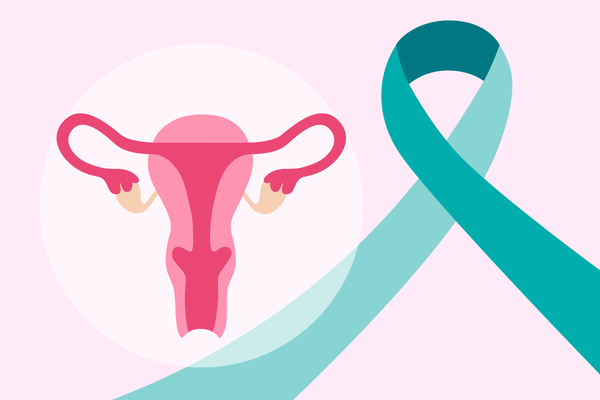A cervical cancer diagnosis is scary — and for good reason. The American Cancer Society estimates that around 14,480 women will be diagnosed with cervical cancer in 2021, and about 4,290 of them will die. Black and Hispanic women are more likely than white women to get this disease.
Cervical cancer used to be the leading cause of cancer death among women in the United States, according to the Centers for Disease Control and Prevention (CDC), but the number of cases and deaths from cervical cancer decreased with the adoption of regular screening with the Pap test. The vast majority of cervical cancer cases are caused by the human papillomavirus (HPV), and an increase in people receiving the HPV vaccine, the addition of HPV testing to cervical cancer screening guidelines, and increased cervical cancer screenings have led to a further decline in cervical cancer rates among women of all races.
We spoke with Nancy Berman, an adult nurse practitioner with emphasis in women's health care and a member of HealthyWomen's Women's Health Advisory Council, to find out more about the link between cervical cancer and HPV.
What is cervical cancer?
Cervical cancer occurs when abnormal cells develop in a woman's cervix, which is the narrow end of the uterus that connects it to the vagina. There are two main types of cervical cancer: squamous cell carcinoma, which starts in the cells that line the outer part of the cervix, and adenocarcinoma, which begins in the cells that line the cervical canal.
What are risk factors for cervical cancer?
The biggest risk factor is contracting HPV, which causes nearly all cervical cancers. Often people's bodies are able to clear the HPV infection within 24 months, but when they don't, the lingering infection can lead to abnormal cell changes in the cervix and, eventually, cervical cancer.
Other risk factors for developing cervical cancer include:
- Smoking
- Sexual history, such as becoming sexually active before age 18, having many sexual partners, and having a partner who already has HPV and/or has multiple sexual partners
- A weakened immune system caused by certain conditions, such as HIV, or by certain medications that suppress the immune system
- A current or previous case of chlamydia, a sexually transmitted infection
- Taking birth control pills for five years or longer
- A family history of cervical cancer
How is HPV transmitted?
HPV is spread through skin-to-skin contact in the genital area and is most often spread during vaginal or anal sex. It can also be transmitted during oral sex.
How common is HPV?
By the time they reach age 50, four out of five women will have had HPV, according to the CDC. As of 2018, HPV infections caused by HPV types that are covered by the vaccine are 88% lower among teenage girls ages 14 to 19 and 81% lower for women ages 21 to 26 than they were in 2006 when the HPV vaccine was approved by the U.S. Food and Drug Administration.
What are the different types of HPV?
Of the approximately 40 types of HPV that are transmitted through vaginal, oral and anal sex, 14 are considered high-risk and the rest are low risk. Two of the high-risk types — HPV 16 and HPV 18 — cause 70% of all cervical cancers. Low-risk types HPV 6 and HPV 11 can cause genital warts.
How can I reduce my risk of HPV and cervical cancer?
The best way to reduce your risk of HPV is to get vaccinated. Other ways to reduce risks include regularly getting tested for HPV, having Pap tests to determine whether your cervix has precancerous cells, quitting smoking, limiting your number of sexual partners and using condoms properly.
If I have HPV, does it mean my partner was unfaithful?
Absolutely not. Research suggests that HPV infections can reactivate after years of being dormant and lead to a positive test even if a woman, or her partner, has not had a new sexual partner.
What are the benefits of the HPV vaccine?
In addition to cervical cancer, the HPV vaccine can also help prevent other cancers that are caused by HPV, such as:
- Vulvar and vaginal cancer in women
- Penile cancer in men
- Throat and anal cancer in both men and women
What are the differences between the Pap test, HPV test and HPV vaccine?
- A Pap test, also known as a Pap smear, is when a healthcare provider collects cells from the cervix and then sends them to a laboratory to see if they are normal or abnormal and to what degree.
- An HPV test is when the cervical cells are tested to see if they have high-risk types of HPV.
- The HPV vaccine, which is given in two to three separate shots spread over six to 12 months, prevents nine high-risk types of HPV, including HPV 16 and HPV 18. The CDC recommends that children begin the vaccines at age 11 (though they can start as early as age 9). The CDC says some women can benefit from getting it up to age 45.
Why is screening for HPV and cervical cancer important?
Early stage cervical cancer often does not have any symptoms, which can make it hard to detect until it is at an advanced stage. The purpose of screening is to find precancerous cells that can be treated to prevent cancer from occurring. Additionally, the change from precancer to cancer can take as long as 10 to 15 years.
Screening for cervical cancer may involve a Pap plus HPV test together (co-testing) every five years, a Pap test alone every three years or an HPV test alone every five years. Different organizations have different guidelines, and it's important to talk to your healthcare provider about what's right for you.
- 9 Warning Signs of Cervical Cancer You Shouldn't Ignore ›
- HPV, Cervical Cancer and Cervical Cancer Screening: What Do You Need to Know? ›
- I Could Have Stopped Cervical Cancer With a Routine Test - HealthyWomen ›
- Benefits of the HPV Vaccination: Cancer Prevention - HealthyWomen ›
- Ask the Expert: HPV and Cervical Cancer - HealthyWomen ›
- Why Is Late Stage Cervical Cancer on the Rise? - HealthyWomen ›
- A Conversation About HPV & Cervical Cancer Screening - HealthyWomen ›
- Get Screened: January Is Cervical Health Awareness Month - HealthyWomen ›
- Facts About HPV - HealthyWomen ›
- Difference Between HPV Vaccine and HPV Test - HealthyWomen ›
- 8 Things to Consider If You Have Cervical Cancer - HealthyWomen ›
- 8 cosas que debes considerar si tienes cáncer cervical - HealthyWomen ›




